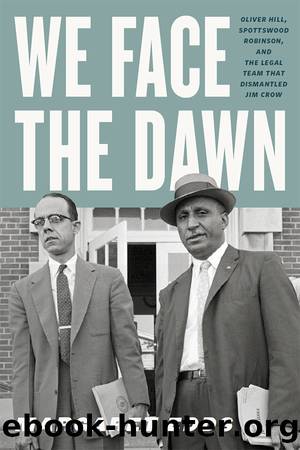We Face the Dawn by Margaret Edds

Author:Margaret Edds [Edds, Margaret]
Language: eng
Format: epub
Tags: Social Science, Ethnic Studies, American, African American & Black Studies
ISBN: 9780813940458
Google: mrs-DwAAQBAJ
Publisher: University of Virginia Press
Published: 2018-02-06T04:12:53+00:00
TWELVE
Segregation on Trial
Spot Robinson filed Davis v. County School Board of Prince Edward County at Richmondâs federal courthouse around midday. By nighttime he was aboard a train slicing through the Carolinas toward Charlestonâs sultry clime and the mannered remains of its plantation caste system. His travel companionsâMarshall, Carter, and a little-known psychologist named Kenneth B. Clarkâhad boarded the train in New York. The addition of Robinson in Richmond reflected Marshallâs growing reliance on the brain power and scrupulousness of a man who at first blush did not seem a natural soul mate. The old friends Hill and Marshall shared a boisterous love of life blended with a seriousness of purpose. Robinson seemed cut from different clothâinexhaustible, less social, and more exacting. Preparing for a case, Robinson rarely diverted his gaze from the grindstone. Once ready, however, he could assume an air of composure that calmed Marshall. âThurgoodâs got his peculiarities like I have mine. In time I got to understand him,â Robinson explained the relationship, one that deepened during the 1950s. âI am trying to get as close to absolute perfection as I can. Thurgood has always kidded me. He says, âThatâs the biggest trouble you have. Youâre a perfectionist.ââ In contrast, Marshall âmakes himself appear from the outside very jovial, not exactly happy-go-lucky, but he takes everything in stride easily,â Robinson said. Over time, he came to realize that appearances were deceptive. Underneath, âThurgood is a very intense person. He could get himself all knotted up sometimes in cases, and I occasionally used to tell him, âLook man. Loosen up. Weâre going to win this case, I think.â Heâs a worrier from way back.â1 In such moments, Marshall relished having at his side a man he could trust to stay steady and give his all.
In many ways the trial that opened five days after the travelers arrived in Charleston proved to be a dress rehearsal for the one that followed nine months later in Virginia. Attorney General Almond acknowledged as much by sending his deputy, Henry T. Wickham Jr., to South Carolina to monitor the proceedings. Robinsonâs presence during the trial and his participation in the high-spirited preliminary strategy sessions also helped shape the Virginia effort.2 Briggs v. Elliott had been four years in the making. Its genesis dated to 1947, when the Reverend Joseph A. DeLaine, of Clarendon County, attended an NAACP meeting in Columbia and came away incensed that white officials were so indifferent to his people. He resolved to seek a plaintiff to attack what he saw as the most blatant of the injustices, the failure to provide a single school bus for the countyâs black children. The lawsuit that ensued met an unfortunate demise when the property of the plaintiff turned out to straddle the line between two districts. Levi Pearson paid taxes in one, while his children went to school in the other. That was the end of that, except for the part of the story where Pearson lost his store credit and the bulk of his crops for 1948.
Download
This site does not store any files on its server. We only index and link to content provided by other sites. Please contact the content providers to delete copyright contents if any and email us, we'll remove relevant links or contents immediately.
Machine Learning at Scale with H2O by Gregory Keys | David Whiting(4282)
Killers of the Flower Moon by David Grann(4024)
Oathbringer (The Stormlight Archive, Book 3) by Brandon Sanderson(3109)
Will by Will Smith(2891)
Once Upon a Broken Heart by Stephanie Garber(2824)
Guns, Germs and Steel by Diamond Jared(2350)
It Starts With Us (It Ends with Us #2) by Colleen Hoover(2318)
Borders by unknow(2297)
Friends, Lovers, and the Big Terrible Thing by Matthew Perry(2208)
The Room Where It Happened by John Bolton;(2140)
The Color of Law by Richard Rothstein(1914)
The Strength In Our Scars by Bianca Sparacino(1832)
HBR's 10 Must Reads 2022 by Harvard Business Review(1828)
A Short History of War by Jeremy Black(1827)
A Game of Thrones (The Illustrated Edition) by George R. R. Martin(1693)
Water Rights and the Environment in the United States by John Burch(1671)
515945210 by Unknown(1654)
Examples & Explanations: Administrative Law by William F. Funk & Richard H. Seamon(1629)
That Every Man Be Armed by Stephen P. Halbrook(1574)
